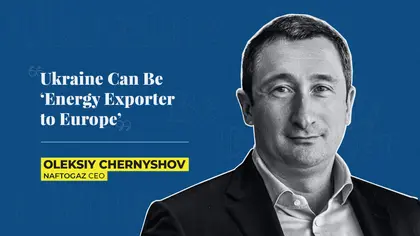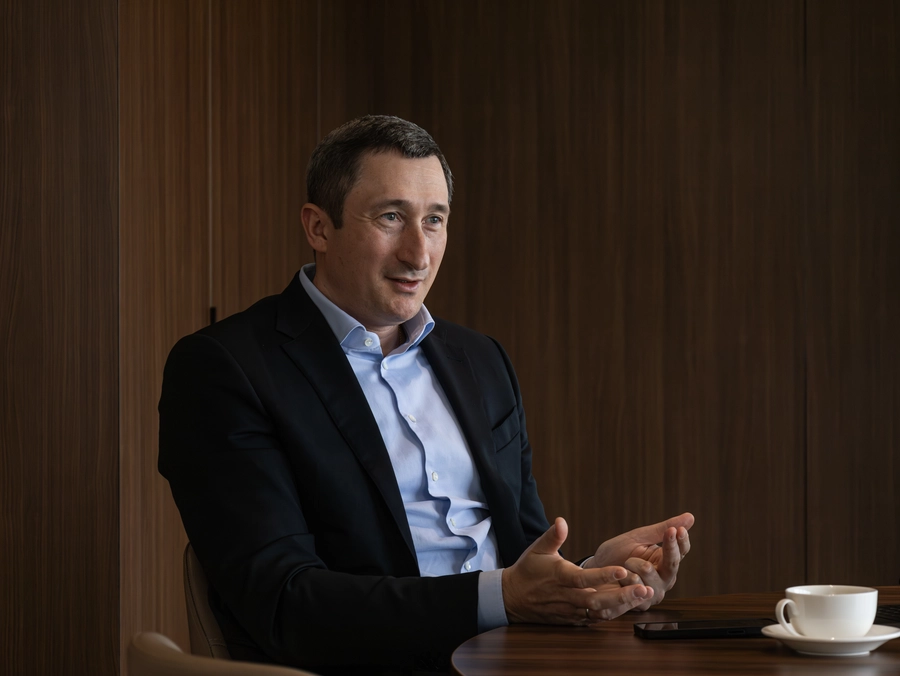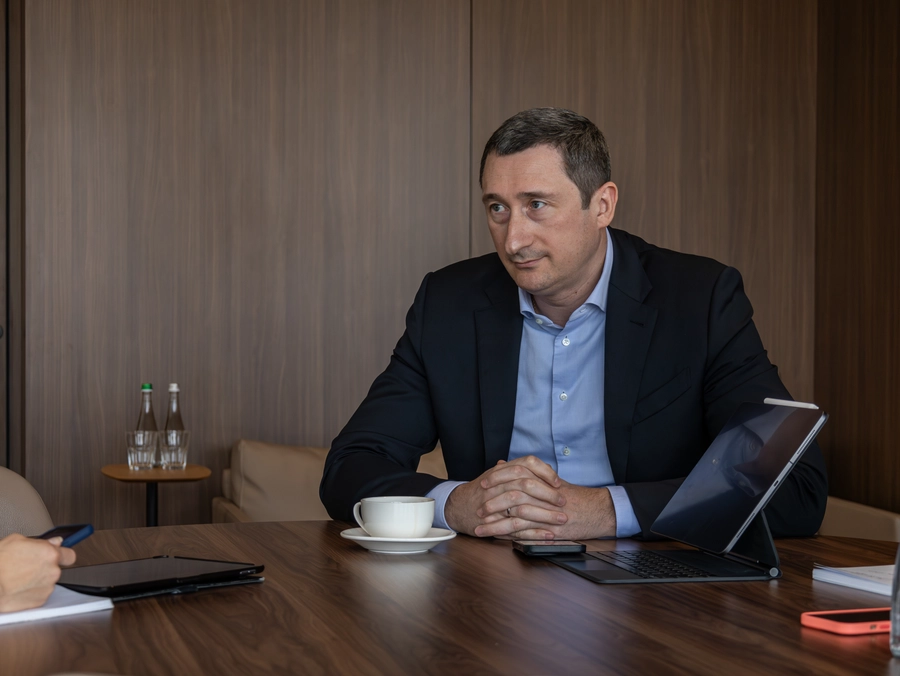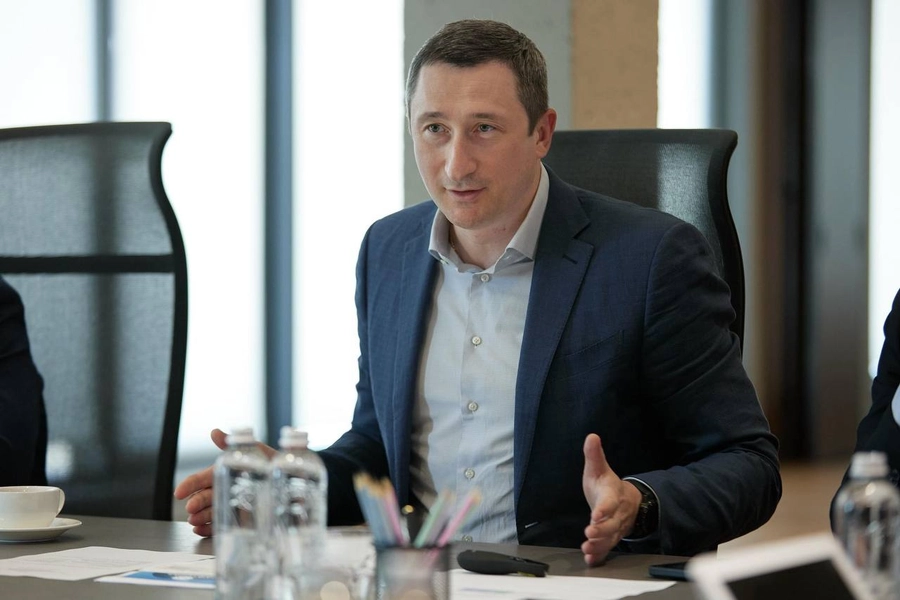In the second part of an exclusive interview, Oleksiy Chernyshov, the head of Ukraine’s biggest energy company told Kyiv Post about his part in restoring trust in Naftogaz, why his company is profitable, and whether Russian attacks on Ukraine's gas system will continue in its ongoing invasion.
The first part of the interview can be read here.
JOIN US ON TELEGRAM
Follow our coverage of the war on the @Kyivpost_official.
In November, it will be one year since you joined Naftogaz. Do you regret changing from your ministerial post (heading Ukraine’s Ministry for Communities and Territories Development from 2020-2022) to a state-owned enterprise?
That’s an interesting question. No, I don’t have regrets.
Naftogaz is a huge challenge – especially at the beginning of the heavy heating season. But I believe that we have shown results.
In your opinion, what did you succeed in doing and what did you not succeed in doing this year?
Of course, not everything is perfect, but when we (Chernyshov and his team) came to Naftogaz, I announced three medium-term goals at once. All of them dealt with restoring trust.
The first was the return of trust from our customers. I can't say there was no trust – but we had to enhance their confidence in us.
The second was to restore the trust of the Ukrainian government – which is a shareholder and client of Naftogaz.
Was trust from the government at a low level too?
In my opinion, this was obvious.
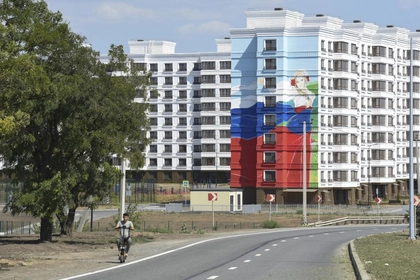
Moscow Imposes Russian Car Insurance in Occupied Ukraine by 2025
Did the previous leadership under Andriy Kobolyev (who headed Naftogaz from 2014-2021) create this situation?
I have one habit – I never blame my predecessors. I would like to remind you that Yuriy Vitrenko also held this post (2021-2022). It’s not something I want to discuss. I have no complaints about any of the previous managers. Each of them did their job. It’s not for me to evaluate. They did a lot of good things so let's not blame them for anything.
The third is the return of the international community’s trust.
We came to a company that was in technical default. Today it is out of default. We have restructured debts, Eurobonds, and we’re already servicing them. We are a fully sound financial company that can access debt markets and become a potent and powerful player in this respect.
As for the government, we’ve pumped gas into our underground storage at a sufficient level to sustain two heating seasons in a row.
Last year, we spent no money from the state budget on this process. This year too.
Now let's talk about extraction.
This year we increased gas production by 7 percent. We continue to do it even during the war and plan to do it next year as well. We have a record volume of new wells. We are investing in it, developing it, and we will not stop.
Currently, we are integrating 26 regional gas distribution companies. This is important because it stabilizes the gas supply at the regional level and control over the process.
These are the so-called assets of the RGC (the Regional Gas Company), which previously belonged to Dmytro Firtash's group (Ukrainian intelligence suspects Firtash embezzled nearly half a billion dollars in gas money). This is an important and complicated process that will be completed by the end of this year.
Today, we’ve already integrated 16 out of 26 companies, but this is more than 80 percent of gas distribution in the country.
Can we say that Firtash no longer affects the gas system?
He does not affect it.
The next issue is the underground gas storage facilities.
What are they?
In Ukraine, we have a strategic asset – the largest underground gas storage facilities in Europe (31 billion cubic meters).
Last year, we had no companies not located in Ukraine storing gas in our storage. This volume is too much for us, we only need half of it actually. Half is always offered for rent. For us, this is both business and additional insurance.
This year, we managed to attract major energy companies. More than 2 billion cubic meters were injected into the storage facilities and the process continues. They pay money to the state budget for the service.
How much does Ukraine earn from this?
We get money for pumping gas into storage, storing it, and taking it out of storage. That is, it is always a profitable business for us. In this regard, it is a strategic asset, it will always remain state-owned. Therefore, 2 billion cubic meters is almost a billion dollars.
I believe that today Naftogaz is almost the only company that has attracted such a volume of assets to the country without additional guarantees. Moreover, our partners trust us.
Can we say that Naftogaz has ceased to be a non-profit state enterprise?
According to its business model, Naftogaz is a priori a profitable enterprise. Demonstrating stable profit indicators is hindered by certain state regulations on how much Naftogaz charges consumers.
Let's face it, all our 12.5 million household customers pay at non-market regulated gas prices (during martial law in Ukraine, there is a moratorium on raising tariffs on the natural gas market and for supplying heat).
In a state-owned company, whose prices are regulated by the state, talking about objective indicators of profitability is nonsense.
Part of the profit isn’t calculated – because prices don’t correspond to reality. Moreover, the company has a special social duty.
I assure you that Naftogaz is a profitable, efficient, enterprise, which – subject to the introduction and implementation of the energy market in the country, in a competitive environment – will certainly demonstrate constant stable indicators.
Probably, it will serve as a greater support for Ukraine’s budget than it does now, because, on the one hand, the government limits prices for energy resources – namely gas and electricity.
On the other hand, the government has to pay subsidies to citizens and compensate all the losses to all participants in this process. There’s never enough money for that.
In the end, who pays extra for it? We are with you. One way or the other, energy costs as much as it costs. Simply, there is a redistribution of this value.
In my opinion, with the introduction of the energy market, competition and quality of services will increase, while consumption will decrease.
Zelensky said that the price of gas for the population could not be raised until the end of the war. Do you talk about it with him?
I am aware that during the war, we will not raise the price of gas, especially this winter. Moreover, it’s legislated.
What will happen next?
This is complex work. It is impossible to change gas prices without affecting other types of energy.
It is impossible not to synchronize this with the corresponding amounts of subsidies for those segments of the population that need it. That is, it is complex preparation.
In any case, I believe that if we want to help someone, we as a state can help with a subsidy.
When we actually supply gas to customers who, in my opinion, can pay the market price, it isn’t fair.
You constantly repeat that Ukraine will be provided with gas for the winter period, that Naftogaz has even exceeded the gas production plan for next year (more than 15 billion cubic meters). Do you think it's dangerous to talk about this during wartime?
The enemy will surely attempt to deprive Ukrainians of basic needs, such as heat and light.
No matter what figure Naftogaz says.
We must take care of the peace and stability of Ukrainian citizens, our cities, and our enterprises. Therefore, in my opinion, this information is important.
Despite the volume of gas in storage, I am sure that the enemy will do everything it can to attack our energy system.
How vulnerable is the gas system to possible Russian attacks?
Attempts to attack the gas system haven’t stop. They weren’t only happening last winter, but throughout the year. We are talking about the oil and gas industry, which is generally vulnerable. Of course, we carry out protective measures, cooperate with the military.
Is Naftogaz at risk?
Let's remember where our main gas producing area is located. It is located in Kharkiv and Poltava regions, where 85 percent of our production is concentrated.
Sometimes we are very close to hostilities, sometimes we are right on these territories. Despite this, we are increasing production.
Of course, now we all work under threat.
How do you encourage people to work in hazardous areas? With money or other means?
Now it is wartime. Each of us must defend the country. When we say that Naftogaz workers are workers on the energy front, these are not just empty words – because many of them work under constant threats, under constant shelling.
They repair networks, restore gas supplies.
Imagine, last winter we supplied more than 200,000 customers in Donetsk region (this region is under constant shelling by the Russians).
Of course, this entire area also needs gas supply. Of course, our people work there. Some are engaged in distribution, some – in gas and oil production, in transportation, storage, processing. Everyone is under certain threat, but this is each person's conscious choice.
How do we encourage people?
I am grateful to these people for their choice, for making this decision.
When I came to Naftogaz, I immediately gathered the team and said either we work here, or we don't. Therefore, I don't accept remote work, even remote office work. We said ‘goodbye’ to everyone who left the country.
Are there many such people?
There were many.
However, most people consciously chose this path, I am very grateful to them.
This is a conscious choice. Either you are at the front, or you work here. This is important.
We have more than 2,000 people from Naftogaz at the front now. This number is growing.
We have staff shortages in some areas.
We cannot now sell gas to other countries. Can Ukraine, in the future, become the main gas seller in Europe?
Ukraine ranks third in Europe in terms of natural gas reserves. Its production can be significantly increased.
Of course, it requires investment.
Investments result from changes in the country, particularly, reforms. We talked about them before. Therefore, from the point of view of our natural capabilities, it is absolutely achievable.
Ukraine has a very serious asset – this is our gas transportation system. It can supply gas to customers in Europe.
Of course, we all understand that with a decrease in gas consumption in our country and an increase in gas production – at some point Ukraine will be able to become a stable energy exporter, of both gas and electricity.
Our geographical and infrastructural position allows us to do this. However, this is impossible without the market.
In April, you reported that the Permanent Court of Arbitration in The Hague ordered Russia to pay Naftogaz $5 billion. This money is compensation for the assets that Naftogaz had in Crimea before its annexation by the Russians. At what stage is the execution of the court ruling now?
This is a historic event for our country. Naftogaz worked on this for about seven years. This is a very long project and it’s not over yet.
We understand that Russia is unlikely to voluntarily pay anything.
Therefore, we have already filed additional lawsuits in other jurisdictions, particularly in the United States.
Is it currently unrealistic to receive these $5 billion, for example, through the confiscation of Russian assets around the world?
In time, it will be realistic.
You can also highlight the text and press Ctrl + Enter


